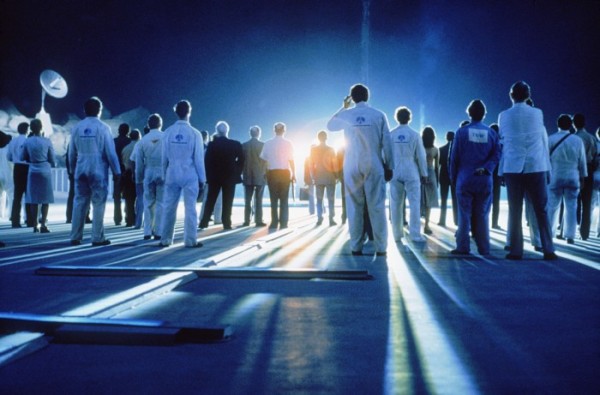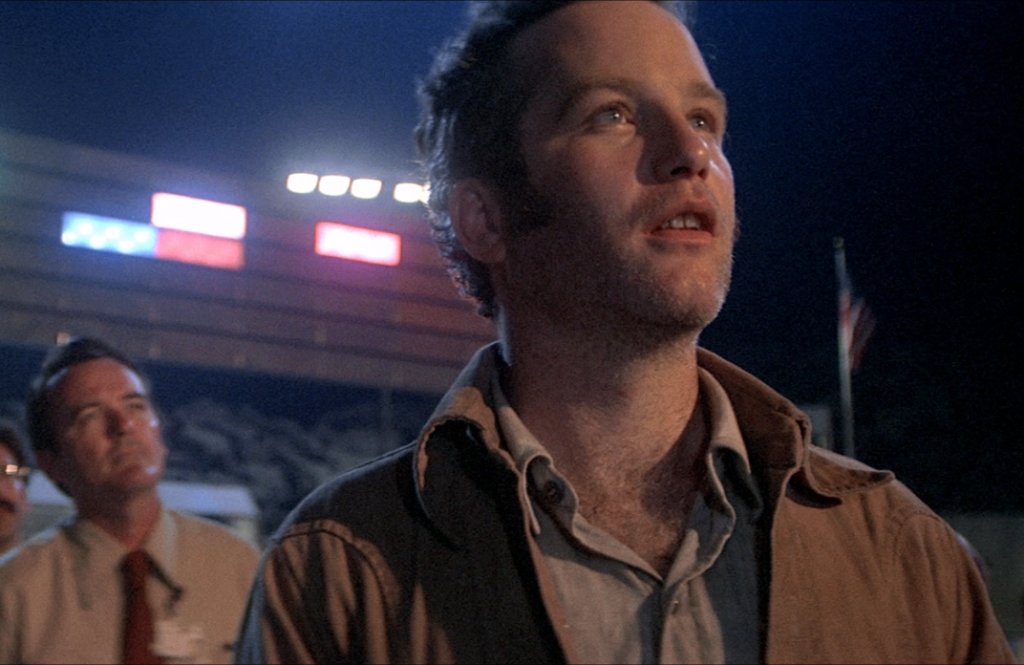Genre: Sci-fi
Premise: An Air Force Lieutenant assigned to debunk UFO sightings has a sighting of his own, which changes his approach to life.
About: This is that often-talked about draft of Close Encounters of the Third Kind that Spielberg did a complete rewrite of. How drastically did he change things? And why mess with a script written by one of the best screenwriters of the 70s? Paul Schrader had written Taxi Driver and would go on to write American Gigolo, Raging Bull, and The Last Temptation of Christ. He was also utilized as the number one script doctor of that era.
Writer: Paul Schrader
Details: 133 pages
I’ll start this review off with a giant thank you. Thank you, Steven Spielberg, for making sure this version of Close Encounters never saw the light of day.
I’ll go one step further. The ineptitude of this script makes me retroactively question Taxi Driver. I now wonder whether that movie was one of those lucky accidents, an accumlation of many different contributors coming together to make something great in spite of a weak screenplay. Because, when you think about it, Taxi Driver is a pretty messy script. I suppose I should give credit to Schrader for creating a great character. But that narrative was always all the hell over the place.
We see the same with Kingdom Come, a bizarre excuse for a UFO movie that feels like it was written in eight different sections and pieced together on an assembly line. To say this script is a mess is an understatement. And it forever alters how I see the screenwriter who is Paul Schrader.
It’s 1960 and Paul VanOwen, a 40 year-old Air Force Lieutenant, has been given the unenviable task of investigating UFO sightings. These sightings are happening more and more often across the country, and as far as VanOwen is concerned, they’re all hogwash.
Then a big one comes along – a series of sightings in the small town of Clarenceville, Indiana. VanOwen goes down there with a small team to tell anyone who believes in this nonsense that they’re a moron. But then, while driving back to his hotel one night, he has a close encounter with an alien ship.
VanOwen’s entire outlook changes, to the point where he’s begging the U.S. Government to give UFOs a legitimate look. They end up telling him to screw off, but later on, VanOwen is cornered by a secret group who call themselves “Project Grief.” These are the REAL government UFO investigators, so Top Secret that their own government doesn’t even know of their existence. Huh?
They ask VanOwen if he wants to join, but concede he’ll have to leave his family and pretend he’s dead to do so. Sure! He says, without a second thought. Cut to 13 years later and VanOwen is still on the hunt for that perfect UFO case, the one that’s going to finally reveal that UFOs are, indeed, real.
Unfortunately, Project Grief spends most of its time sitting around waiting, not unlike firefighters between fires. The only difference is that it takes a lot longer for a UFO sighting to come along than it does a fire. Which means lots of waiting. And waiting. Oh, and did I mention waiting?
Eventually, a big sighting comes along, and it’s time to find out if all this hard work is going to pay off. Too bad for VanOwen and the rest of his team that everyone who’s read this script has fallen asleep by this point and will never find out what happens. Including Steven Spielberg himself.
Man.
This was baaaaaad. Michael Jackson Bad. Jamon.
I’m not even sure what I just read.
It’s funny. There are always these stories about these “alternate drafts” of famous movies that are so much better than what was filmed. EVERY TIME I’ve read one of these supposed “better” drafts, they’ve turned out to be awful.
It’s geeks trying to conjure up controversy despite it making ZERO sense to film an inferior draft. I mean, why would anybody knowingly do that? At worst, the other drafts are DIFFERENT. A different vision from a different person. But they’re never better.
With that said, there are still a couple of debate-worthy screenwriting topics here. The first is our main character. Schrader’s hero is a military man right in the middle of the action. Whereas Spielberg’s Roy Neary was a nobody family man nowhere near the action.
If you’re a studio, you’re probably favoring Schrader’s hero. You typically want your main character as close to the action as possible. And if VanOwen is an air force UFO investigator, he’s going to be have lots of opportunities to get into interesting situations with UFOs, the military, and the government.
Roy Neary has to see all of these things from the outside, which is arguably not as interesting.
But maybe this is part of Spielberg’s genius. Despite so many writers favoring the military man route, Spielberg’s always liked the “ordinary man stuck in an extraordinary circumstance” setup. And I think it works because the ordinary man is more relatable. I don’t personally know any CIA or FBI agents. But I know plenty of regular dudes. It could easily be you, then, who had that close encounter. You’re just like Roy Neary!
But where Spielberg really shows his brilliance is in how he takes everything that Schrader TELLS, and turns it into a SHOW. Show don’t tell. Show don’t tell. Show don’t tell. This is Screenwriting 101, arguably the first thing they teach you about the medium. For Schrader to have no concept of SHOW DON’T TELL is baffling.
His entire opening is people talking about their sightings. We don’t see any sightings. We just hear people talking about their sightings. How does Spielberg start Close Encounters? It’s show after show after show. It’s the air traffic room sequence. It’s running into a desert to see a bunch of planes that went missing 30 years ago having returned out of nowhere. It’s giant groups of people chanting a mysterious alien melody.
And if there’s a lesson to learn from this abysmal script, it’s that. Scharder was thinking LIKE A WRITER. Spielberg was thinking LIKE A FILMMAKER. He realized he had to SHOW the audience something. That having characters engage in pages of recollections about the UFOs they saw wasn’t going to be interesting to watch. So keep that in mind guys. You’re writers. But you’re writers FOR THE SCREEN.
Kingdom Come becomes laughably bad as it continues. At one point, VanOwen shows up at his old family home, 15 years after he suddenly disappeared from his family’s lives, and his wife is surprised by his arrival for all of one second before she casually suggests, “Come inside. Let’s talk about what you’ve been up to.”
The dialogue here is routinely awful. Here’s an example. Late in the script, a couple of years after Project Grief has dispersed, VanOwen, still working for the government, runs into Judy, an ex-member of the group. She starts the conversation…
“What are you doing? What’s going on?”
“Judy, you know I can’t tell you. You’re on the outside now.”
“I can keep a secret.”
“But I can’t tell you.”
“But I spent four years in the Project. It was a very big part of my life. I have to know if anything’s happened.”
“Come on, let’s have lunch and talk about other things. Let’s enjoy the sunshine.”
I mean, in a way, it’s almost encouraging. You have this titan of screenwriting writing garbage dialogue. If he struggles, it’s obviously okay for the rest of us to struggle as well.
Schrader keeps the hits coming, at one point sending us out into the stars and into a nebula shaped like a vagina. I guess the acid really was flowing back in the 70s.
I can only imagine Spielberg taking one look at this script and saying, “What the fuck is wrong with you, dude? I’m trying to make a movie here. Not Easy Rider 2: A Junkie’s Jaunt Through the Milky Way” (but, you know, in that nice Spielberg way where he doesn’t let on that he’s never going to call you again).
I wish I could say there was anything good about this but there isn’t. It’s the screenwriting equivalent of an interstellar vagina.
[x] What the hell did I just read?
[ ] wasn’t for me
[ ] worth the read
[ ] impressive
[ ] genius
What I learned: Make sure to have a plan for your script beyond your first act. Or else after the act is over, you’ll be flailing in the wind trying to come up with plot beats and story threads. And you’ll convince yourself that it’s coming together. But trust me. When the reader reads it, they know you have no clue where you’re going. I say this because Schrader at least knew what he wanted to do with the first act here – send VanOwen to a town that was experiencing a UFO flap. But he didn’t have a clue what was going to come next. And it caught up to him. The power of outlining, guys!



